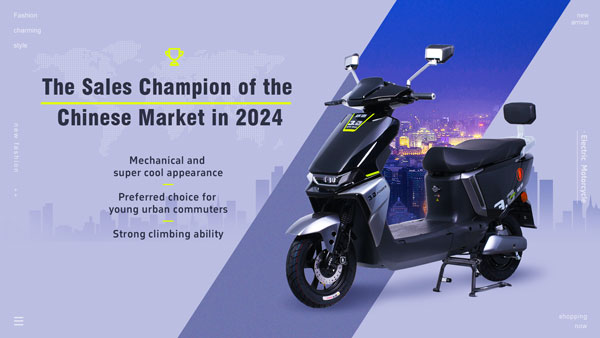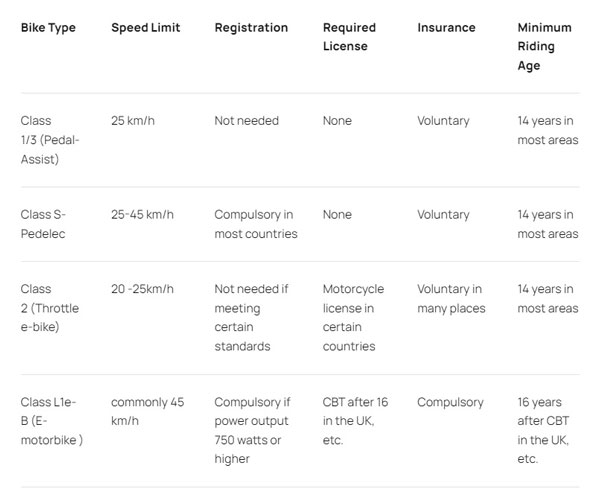Electric bicycles are becoming one of the most important ways of commuting and traveling in cities. As we all know, electric bicycles exported to the world need to meet a series of strict certification requirements of the local market.For example,the EU requires that electric bikes must pass certifications like RoHS, CE, FCC, etc. So what are these certifications for, and what types of e-bikes can legally be driven on public roads in Europe?
What certifications are required for electric bicycles to be exported to the EU market?
CE certification
The certification of CE is a mandatory requirement, and it helps meet the health safety and environmental protection requirements.The customs in European countries check the CE certifications when the electric bikes are transported, as the ones without them are prohibited from selling in the market.
CE certification EN 15194:2017 standard:
The scope of the EU electric power bicycle standard EN15194:2017 (if the electric bicycle does not meet the following conditions, it needs E/e-Mark certification to be exported to the EU)
1. The DC voltage shall not be higher than 4
2. The maximum continuous rated power is 250W
3. When the speed reaches 25 kilometers per hour, the output power must be gradually reduced until it is finally cut off
4. Comply with EU Safety Directive 2002/24/EC
ECE certification
EU E-mark is a certification system implemented in Europe for vehicles and parts and components. According to relevant regulations, standards and hunting order requirements, all vehicles and major parts and components that need to enter the market of its member countries must pass E-mark certification. , and the corresponding certification mark should be printed on the product, otherwise it will be marked by customs and punished by the market supervision agency of the importing country, and the vehicle will not be listed on the road. (E-mark is divided into two forms: E-mark and e-mark.)
E-mark certification
E-mark certification is a technical requirement implemented by the Economic Commission for Europe (ECE) for the export of vehicles and quarterly parts products to the markets of its member countries. The certification standard is ECERegulation. The Economic Commission for Europe is one of the agencies affiliated with the United Nations. First, it is not the other member states of the European organization. About 60 countries from Europe, Asia, Africa, and Oceania respectively recognize this certification. At the same time, certificates issued by any member state are mutually recognized in other member states. Since the abbreviation of Economic Commission for Europe is ECE, E-mark certification is also called ECE certification.
e-mark certification
e-mark certification is a mandatory product certification system implemented by the European Union for vehicles entering the market of its member states. According to the certification standard ECDirection, only after the vehicle and related parts pass testing and production consistency requirements, and have the corresponding certification mark printed on the product, can it enter the EU market for sale and be listed on the road. All EU member states can issue e-mar certificates, and certificates issued by any member state can be recognized by other member states. Since the predecessor of the EU was the European Economic Community (EEC), it was later renamed Europe. Community (European Community, referred to as EC), so e-mark certification is also called EEC certification or EC certification.

Registration
Registering an e-bike is compulsory for certain classes in some European territories. Electric bikes with 250 watts of motor power and assistance up to 25 km/h don’t require registration, while S-Pedelecs rated at 500 watts up to 45 km/h necessitate e bike registration in Germany, Austria, and most other countries. Class 2 e-bikes (throttle-controlled e-bikes) don’t require it as long as they meet certain standards. Class L1e-b e-bikes with higher power output than 750 watts require registration.
Registering process varies from country to country. Generally, it involves completing registration forms with basic identification and motor specifications. Benefits include proving lawful vehicle ownership, assisting recovery if stolen, and facilitating insurance claims in case of any incidents during transit.

- Previous: The evolution and future trends of electric motorcycle batteries
- Next: The electric bike market has grown significantly, driving the continuous expansion of the kit market
Post time: Aug-14-2024






